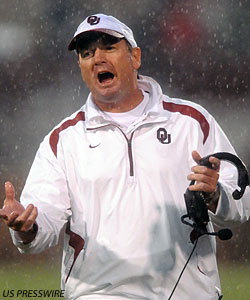Commitment changes becoming more common

MORE: New Rivals250 | New five-stars
Want to commit to Oklahoma? You better not let Bob Stoops catch you playing footsy with Texas under the table at some out-of-the-way restaurant.
Advertisement
Interested in a secret, West Coast tryst with USC? You'll need to operate in stealth and avoid leaving a trail.
Stoops is watching, make no mistake about it. Get busted, and he'll toss your belongings out a second-story window and onto the lawn. Divorce papers will follow. The Sooner head coach doesn't take well to recruiting-trail philanderers.
"It's like me telling my wife, 'hey, we're going to get married in February,'" Stoops said. "But until we do, I'm going to date these other three girls all through September, October and November until we get married. That doesn't work.
"A kid is not committed if he's taking visits. We tell them that. We tell them, 'if that's the case, we don't accept your commitment and we'll keep recruiting guys at your position.'"
Discussions about the need for an early signing period aren't new. They are also all hypothetical. Until further notice, this is the era of hard sells and soft commitments.
Verbal pledges have become placeholders. They are simply reservations, not promises. Broken dentist appointments carry more consequence. Nobody here receives partial payment if things don't work out. So even if everyone's stance on the matter isn't as militant as Stoops', some semblance of commitment-switch paranoia inhabits the head of every FBS coach.
"When they're taking other visits, you have to know in the back of your mind that there's a chance they may not come to your school," said Oklahoma State head coach Mike Gundy, who says his program will accept commitments from players with a wandering eye depending on circumstance.
Florida's Will Muschamp is all too familiar with the risk. His program has lost five committed prospects in the last month or so. Whether or not the flip-flopping is a problem from the sport is open for discussion. What's not up for discussion is the fact that it's becoming more common with each passing year.
"You're going to continue to see it happening," Muschamp said. "It's not going to stop. The process keeps getting earlier. And the earlier it gets, the more you're going to see."
So whose duty is it to make sure that teenagers not old enough to buy beer, or in some cases see rated-R movies, keep their word? Some on the college level, including Muschamp, say players and their parents should feel a moral obligation to follow through. There's another camp, though. A camp that thinks high school coaches should play the role of advisor.
Tony Sanchez, head coach at Las Vegas powerhouse Bishop Gorman High School, isn't ready to shoulder the blame for fickle nature of today's recruiting. He'd like to see the people complaining accept partial responsibility.
"At the end of the day, yes, part of it is on the high school coach," Sanchez said. "But a lot of these college coaches do a lot of recruiting and don't even talk to the high school coaches as much as they should. I had a kid commit to the University of Miami and I never talked to a Miami coach the entire time. Even after signing day.
"Some coaches that don't do much consulting with the high school coaches, then, if it doesn't go right, they want us to jump in and be the savior of the day."
Sanchez would rather talk about college coaches suddenly rescinding scholarship offers. He notes that things seem to be just swell when the roles are reversed. He points out that college staffs push for early commitments from underclassmen who have yet to visit campus and then slap on a frown when a player changes his mind.
"In my word, blaming the high school coach is hilarious," Sanchez said. "Twice in my career, I've had a major university offer my kid and then pull the scholarship. Oh, and what about schools that sign more kids than they have scholarships for? It happens every year. There's enough blame to go around for what this has become."
Players, like the coaches courting them, are looking out for No. 1. When Oregon-based wide receiver Tanner Shipley, a member of the 2013 class, broke his pledge to BYU a month ago, he gave the most common explanation.
"I rushed it," Shipley said.
But whose fault is that? It's a question with a list of correct answers.

Click Here to view this Link.
[rl]